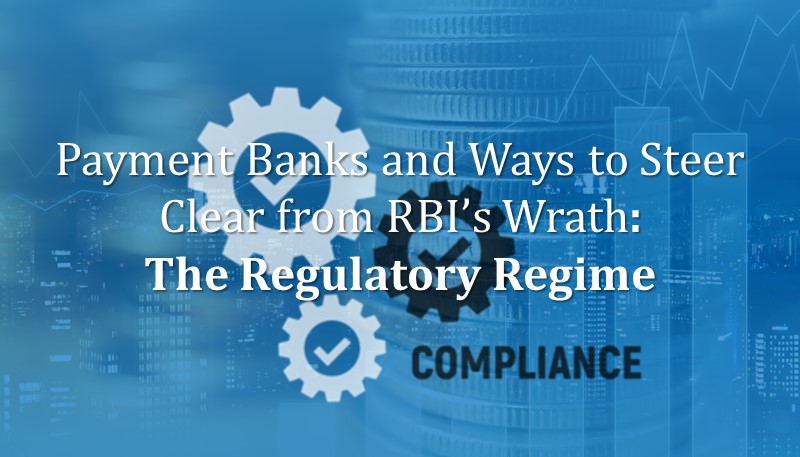Reams have already been written on the RBI’s recent decision to impose stringent strictures on Paytm Payments Bank (‘Paytm’), virtually signalling its end by the end of February, 2024. However, the regulatory aspects which Paytm fell afoul of and the broader implications of those regulations on the payments business need further scrutiny. We at Lexplosion assist a number of companies in the payments business with their compliance requirements in India. Given below is our perspective on the issue.
Payment Banks in a Nutshell:
A Payment Bank can be explained as a quasi or a semi-bank. It acts like a bank but does not have all features of a bank. It can accept demand deposit like a bank. However the amount of deposit that can be accepted cannot exceed Rs. Two (2) lakhs[1]. Payment Banks can issue debit but not credit cards. They also cannot undertake lending activities directly.
Key statutory concerns raised and remedies:
Related Party Transactions:
The shareholding pattern of Paytm Payment Bank, which is 49% shareholding of One97 Communications Limited and 51% shareholding of Vijay Shekhar Sharma (founder and Managing Director of One97 Communications Limited) raises concerns about related party transactions and the arm’s length requirement mentioned under the Operating Guidelines for Payment Banks dated 6th October 2016 (‘Guidelines’).[2] The Guidelines state that all payment banks can engage all permitted entities including the companies owned by their business partners and own group companies on an arm’s length basis as Business Connections.
What is meant by ‘arm’s length transactions’?
‘Arm’s length transaction’ means a transaction between two related parties that is conducted as if they were unrelated, so that there is no conflict of interest. It is to assert that both parties act in their own self-interest and are not subject to pressure from the other party.
Remedies:
Statutory disclosures with respect to related party transactions along with resolutions passed by the Board of Directors prior to undertaking any related party transactions, lower the possibilities of conflict-of-interest issues.
Conformance with KYC norms:
Concerns about non-compliances with KYC norms[3] has also been raised against Paytm Payment Bank. Poor KYC checks and non-validation of PAN for accounts have been highlighted as key concerns. This is due to instances where a single PAN had been used for opening more than 1000 accounts with the bank. As per the KYC norms, KYC should be conducted for all accounts being opened with the Payment Bank which should include validation of PAN, sharing KYC details with the authorities, having periodic audits, etc.
This has raised money laundering concerns. RBI has come down heavily on Paytm as it handles very large sums of public money (specially money from small businesses and unbanked sectors of our population). Any impact to this would impact the economy significantly.
Remedies:
-
Having a customer acceptance policy in place and conducting stringent customer due diligence at the time of onboarding of customers.
-
PAN validation from the issuing authority.
-
Maintaining record of all customer transactions and filing Suspicious Transaction Report to the Financial Intelligence Unit – India.
-
Sharing KYC information with the Central KYC Records Registry.
-
Having in place concurrent/internal audit system to verify the compliance with KYC/Anti-Money Laundering policies.
-
Submission of quarterly audit notes and compliance to the Audit Committee.
-
Carrying out Money Laundering and Terrorist Financing Risk Assessment exercise periodically.
Conformance with license conditions:
The license issued by RBI to any entity for carrying out the operations as a payment bank, comes with a set of conditions[4]. These conditions have also taken a hit for Paytm Payment Bank. The maximum balance permitted for each account per day has been breached.
This effectively also points towards money laundering concerns.
Remedies:
-
Strict adherence to the conditions of the license issued by RBI to permit operation as a Payment Bank.
-
Maintaining limit of INR 2 lakh as the maximum balance at the end of each day per individual customer[5]. Payment Banks can, with prior consent of the customer, transfer the funds deposited by the customer into her/his account to another eligible bank, to maintain the daily limit of INR 2 lakh[6].
With a view to strengthen the existing compliance monitoring, RBI has also notified Streamlining of Internal Compliance monitoring function – leveraging use of technology dated 31st January 2024 mandating Supervised Entities vis-à-vis Payment Banks to have robust compliance monitoring mechanism by leveraging the use of technology by 30th June 2024 (you can refer to our blog on the subject as referred in the footnote below[7]).
For further details, please reach out to Lexplosion. Through our flagship compliance management solution – Komrisk, we cater to the compliance requirement of varied industries. If you are in the payment industry, feel free to reach out to us. A number of companies operating in the financial and payment industry are already benefiting from the use of Komrisk.
[1] Please refer to:
- Guidelines for Licensing of Payment Bank dated 27th November 2014,
- Operating Guidelines for Payment Bank dated 6th October 2016
[2] Companies (Meetings of Board and its Powers) Rules, 2014 and Operating Guidelines for Payment Bank dated 6th October 2016
[3] Master Directions on KYC, 2016
[4] Guidelines for Licensing of Payment Bank dated 27th November 2014
[5] Refer to:
- Guidelines for Licensing of Payment Bank dated 27th November 2014
- Enhancement of limit of maximum balance per customer at end of the day from ₹1 lakh to ₹2 lakh – Payment Bank (PBs) dated 8th April 2021
[6] Limits on balances in customer accounts with Payment Bank – sweep out arrangements with other banks dated 29th June 2017
[7] To know more, refer to our Blog on ‘NBFCs to implement technology-driven compliance solution by June 30th 2024: RBI’
Written by: Soham Thakur
Disclaimer
All material included in this blog is for informational purposes only and does not purport to be or constitute legal or other advice. This blog should not be used as a substitute for specific legal advice. Professional legal advice should be obtained before taking or refraining from an action as a result of the contents of this blog. We exclude any liability (including without limitation that for negligence or for any damages of any kind) for the content of this blog. The views and opinions expressed in this blog are those of the author/(s) alone and do not necessarily reflect the official position of Lexplosion Solutions. We make no representations, warranties or undertakings about any of the information, content or materials provided in this blog (including, without limitation, any as to quality, accuracy, completeness or reliability). All the contents of this blog, including the design, text, graphics, their selection and arrangement are the intellectual property of Lexplosion Solutions Private Limited and/or its licensors.
ALL RIGHTS RESERVED, and all moral rights are asserted and reserved.





